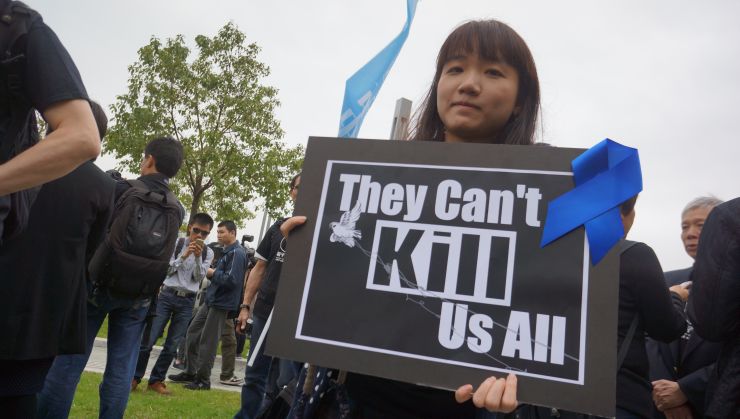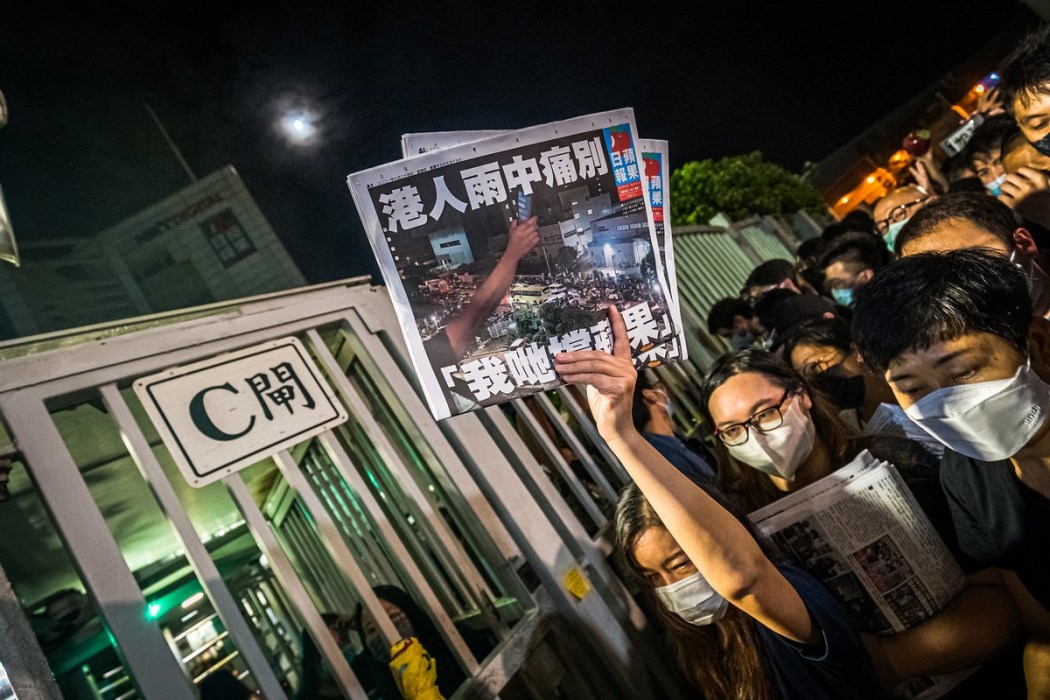A record number of journalists were behind bars this year, according to an annual census released by the Committee to Protect Journalists which – for the first time – included journalists from Hong Kong in the data.

The watchdog listed 293 journalists behind bars as of December 1, compared to 280 in 2020. It was the sixth consecutive year in which more than 250 journalists have been held worldwide.
As in past years, China – whose figures include Hong Kong – remains the world’s worst jailer, with 50 currently behind bars. Myanmar came in second place with 26, followed by Egypt with 25, Vietnam with 23 and Belarus with 19. Other countries in Asia that made the list were India with seven; Cambodia with four; and Bangladesh, the Philippines, and Sri Lanka with one each.
“This is the sixth year in a row that CPJ has documented record numbers of journalists imprisoned around the world. The number reflects two inextricable challenges — governments are determined to control and manage information, and they are increasingly brazen in their efforts to do so,” said CPJ executive director Joel Simon.
“Imprisoning journalists for reporting the news is the hallmark of an authoritarian regime. It’s distressing to see many countries on the list year after year, but it is especially horrifying that Myanmar and Ethiopia have so brutally slammed the door on press freedom.”
Myanmar’s rise to second place was rapid, having had no journalists in prison as of December 1, 2020. But the February 1st coup in the country saw the junta crack down on the media. The total of 26 journalists jailed as of December 1 understates the gravity of the situation, since the junta has arrested and released dozens of others. CPJ says there may also be others in custody who have not been identified as journalists.

On December 5 photojournalist Kaung Sett Lin and videographer Hmu Yadanar, both of whom work for the independent Myanmar Pressphoto Agency, were arrested and sustained injuries while covering a flash-mob protest in Yangoon. Yadanar was injured after being struck by a truck said to be driven by military personnel. Sett Lin’s injuries are not known, though he was in the same hospital as Yadanar.
At the same protest, soldiers opened fire on the crowd and killed five, according to The Irrawaddy. These arrests occurred after the December 1 dateline on the CPJ report for 2021.
In Ethiopia, which holds nine journalists, the civil war raging between the government and the Tigray People’s Liberation Front has led to an escalation of arrests as the government has imposed emergency laws. Six of the nine journalists were arrested in November as the war intensified.
The CPJ data only accounts for journalists in government custody and those people whom it has confirmed were imprisoned because of their work.

The report also includes other grim statistics from the year:
- The CPJ recorded 19 journalists murdered in retaliation for their work as of December 1, slightly down from the 22 recorded in 2020. Three others were killed this year while reporting from conflict zones, while two were killed while covering protests or street clashes.
- Mexico remained the Western hemisphere’s deadliest country for reporters. Three journalists were murdered in direct retribution for their reporting. CPJ is still investigating six other murders to determine if they were related to their journalism.
- India had the highest number of journalists killed for their work with four.
- Forty of the 293 detained journalists are women.
While the CPJ recorded no journalists in jail in North America on account of their work as of December 1, the U.S. Press Freedom Tracker, which is a partner of the CPJ, has recorded the arrest and detention of 57 journalists in the United States so far this year.
This is along with reports of 141 journalists being assaulted and 36 having had their equipment damaged over the course of the year.

In Canada, photojournalist Amber Bracken and filmmaker Michael Toledano were arrested while covering a land rights protest in late November. Both were conditionally released following a court order after spending three nights in custody.
In an ominous turn for Hong Kong’s journalists, this year’s report also marks the first year in which its journalists have appeared in the CPJ tally. It counts eight journalists, including Apple Daily founder Jimmy Lai, in the data for China.
The CPJ says this is a result of the implementation of the “draconian 2020 National Security Law imposed in response to the city’s historic pro-democracy protests.”
Hong Kong’s refusal to renew a visa for journalist Sue-Lin Wong of The Economist, while not counted in the data, is another sign of declining press freedom. This comes on top of the refusal of work visas to New York Times reporter Chris Buckley and HKFP’s incoming editor Aaron McNicholas in 2020.
Steven Butler, CPJ’s Asia program coordinator, said: “Hong Kong’s refusal to renew a visa for The Economist’s correspondent Sue-Lin Wong shreds repeated claims by the Hong Kong government that it upholds press freedom … Hong Kong authorities should reverse this decision immediately and allow journalists — local and international — to work without interference.”

A survey released in early November by the Foreign Correspondents’ Club of Hong Kong, of which I am an absentee member, reinforces the deterioration of press freedom in Hong Kong. Almost 84 per cent of respondents said the working environment for journalists has changed for the worse.
Problems cited were the unwillingness of sources to be interviewed, self-censorship, or censorship of certain topics within a media organisation.
Almost 76 per cent of the respondents expressed strong concern about the possible introduction of a law to curb “fake news,” which Chief Executive Carrie Lam has said was partly to blame for the 2019 pro-democracy protests. While details of the proposed law have not been given, similar laws have been used to crack down on freedom of the press and free speech around the globe.
So as the calendar turns to 2022, Hong Kong and the world are clearly a less safe, less welcoming, and less stable place for journalists. As the world’s eyes are focused on the fallout from Covid-19, authoritarian governments are continuing to use the cover it provides to crack down on press freedom under the guise of fighting “fake news” and combating the pandemic.
But as the world slowly emerges from the pandemic, perhaps outrage over human rights abuses and lack of press freedom will play a more prominent role in the policies of democratic governments around the world.
Support HKFP | Policies & Ethics | Error/typo? | Contact Us | Newsletter | Transparency & Annual Report | Apps
| HKFP is an impartial platform & does not necessarily share the views of opinion writers or advertisers. HKFP presents a diversity of views & regularly invites figures across the political spectrum to write for us. Press freedom is guaranteed under the Basic Law, security law, Bill of Rights and Chinese constitution. Opinion pieces aim to point out errors or defects in the government, law or policies, or aim to suggest ideas or alterations via legal means without an intention of hatred, discontent or hostility against the authorities or other communities. |
Help safeguard press freedom & keep HKFP free for all readers by supporting our team

More HKFP OPINION:
HKFP has an impartial stance, transparent funding, and balanced coverage guided by an Ethics Code and Corrections Policy.
Support press freedom & help us surpass 1,000 monthly Patrons: 100% independent, governed by an ethics code & not-for-profit.










